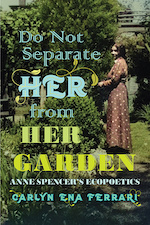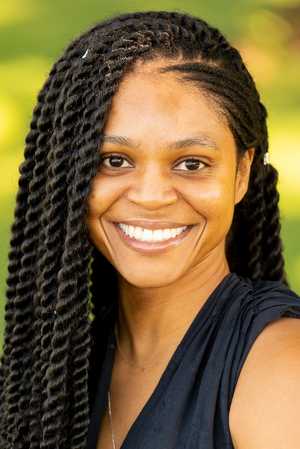Today, we are happy to bring you our conversation with Carlyn Ena Ferrari, author of Do Not Separate Her From Her Garden: Anne Spencer's Ecopoetics
What inspired you to write this book?
I wrote this book out of sheer admiration for Anne Spencer and a genuine desire to ensure that her poetry and legacy are not forgotten. She is a remarkable woman! I first encountered Anne Spencer’s poetry in one of my graduate school seminars, and I was surprised that I had not learned about her sooner. I fell in love with her then, but I was also disappointed to find that there were no books about her in print. The late J. Lee Greene’s 1977 biography Time’s Unfading Garden is no longer in print, and that is the only book about her that has been written. I wanted to do my part to reintroduce her to readers.
What did you learn and what are you hoping readers will learn from your book?
When I started this book, I knew the “basic facts” about Anne Spencer: she was a poet who also liked to garden, and she kept a literary salon during the New Negro Renaissance. I naively thought I had a decent understanding of who she was. However, I quickly learned that I had barely scratched the surface! Now, when I talk about Spencer, I say that she was a Black woman-poet-mother-wife-civil-rights-and-community activist-intellectual-librarian-environmentalist, whose writing career spanned over seventy years—most of which is unpublished—and that still does not fully encapsulate who she was. I also completely underestimated the breadth of her writing. Yes, she is a poet, but she wrote quite a bit of prose as well. In fact, her first publication is actually a short story. I was also surprised to learn how central the natural world is to her worldview. To be honest, I was a bit lost before I came across the Georgia Douglas Johnson letter that inspired the title of my book. Johnson wrote a letter to Spencer saying that she doesn’t separate her from her garden, writing, and philosophy. It was then I realized that I had been treating her writing, writing process, and gardening as individual entities, but they cannot—and should not—be separated from one another. I got a clearer understanding of who she was as a human and as a writer when I followed Johnson’s lead. What I want people to take away from this book is how incredibly dynamic Spencer was. She lived her life on her own terms. She wrote furiously every day, but she published only when she wanted to. Most importantly, I want people to be inspired by her and curious about who she was so that they will want to read her poetry. I want people to visit The Anne Spencer House & Garden Museum in Lynchburg, Virginia, and explore the Papers of Anne Spencer and the Spencer Family in the Albert and Shirley Small Special Collections Library at the University of Virginia.
What surprised you the most in the process of writing your book?
I was surprised by how much I genuinely enjoyed writing this book! It truly brought me great joy to work on this project each day, and I found myself getting lost in her writing. The more I wrote about her, the more I admired her. I want to be like her when I grow up! She was a woman who valued self-care, and I think that really comes through in her writing. Yes, this is a research project, but it’s also my love letter to Anne Spencer. I have always struggled with work-life balance, but I think I came the closest to a sense of balance when I was working on this book, and that was vital since much of this book was written during the pandemic.
What’s your favorite anecdote from your book?
My favorite anecdote is that she quite literally wrote on whatever surface she chose! She wrote on ephemera, but she also wrote on a variety of surfaces including her husband’s accounting ledgers, the walls of her home, the top of a shoe box, and the list goes on. It was truly fascinating to discover how she deliberately transformed ordinary objects into canvases for her writing. The first chapter of my book is dedicated to close-reading her unique writing practice, and I liken her writing process to the way she improvised in her garden. Both in her writing and gardening, she carefully selected the pieces that she wanted to include. I tend to write on post-its and scraps of paper as well, so it was also fun to learn that I have this unconventional practice in common with Spencer.
What’s next?
I am often asked whether I am a gardener, and I am not—at least not yet. I am embarrassed to admit that I have the opposite of a green thumb, which is unfortunate because I come from a family of gardeners. So, my next “project” is working on my gardening skills—starting with one plant! Gardening takes patience, so I will certainly gain some valuable lessons on this journey.
In terms of new research, Spencer was certainly not alone in her appreciation for nature, so my future work will highlight how the natural world—and gardening, in particular—has inspired Black women’s writing and activism throughout history.





